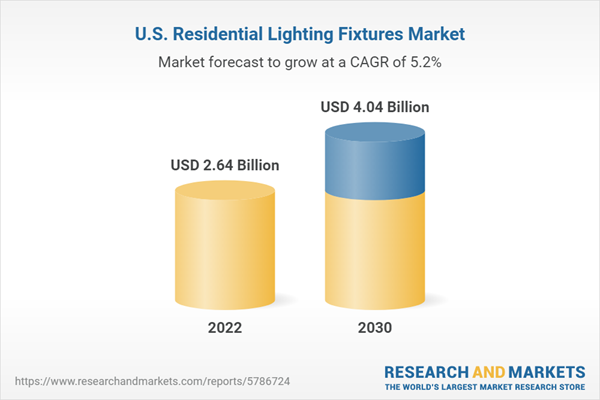The LED & OLED segment held the largest market size in 2022 and is further expected to remain the dominant segment during the forecast period. The U.S. Department of Energy estimates that quick adoption of LED bulbs will save USD 265 billion over the next 20 years. This changeover would also help avoid the construction of 40 new power plants and reduce greenhouse emissions into the atmosphere. Smaller size, greater reliability, and substantial energy savings are attributes contributing to the popularity of LED lighting. The usage of LED bulbs in residential applications varies across key household characteristics, such as household income as well as ownership status. According to the 2020 Residential Energy Consumption Survey by the U.S. Energy Information Administration, households in the country are largely switching to LED bulbs; 47% report using LEDs for most or all of their indoor lighting. Among households earning below USD 20, 000 a year, 39% reported that LED bulbs were their foremost indoor lighting c
hoice, whereas 54% of households earning USD 100, 000 or more per year used mostly LED bulbs.
The pendants & chandeliers segment is expected to register the fastest growth over the forecast period. Pendants are often purchased in large quantities and utilized in spaces with a specific function, such as kitchens or dining rooms because they are smaller than chandeliers. They're most typically placed over kitchen islands, but they can also be hung in entryways, over dining tables, or over the sink. If users prefer ambient lighting over task lighting, they should choose a pendant lamp with an upward-facing shade. Chandeliers have classier designs and are thus more fitting in hallways and lobbies with high ceilings. Pendant lights are more practical to use, while also maintaining a particular style.
The Commonwealth Edison (ComEd) study also indicates that, in order to mimic market shares for different bulb technologies within the standard and reflector product categories. The poll used discrete choice. At current market prices and with typical bulb qualities for each technology, such as bulb life, light color, and annual energy cost. The results imply that buyers prefer LEDs over alternative technologies. ES LEDs would account for 64% of standard bulb sales, with non-ES LEDs accounting for the remaining 22%. ES and non-ES LEDs make for a whopping 86 percent of total sales. As indicated in the graph below, CFLs account for less than a tenth of sales (8%) while incandescent account for the remaining 6% of lighting sales.
Major players in the U.S. residential lighting fixtures market include Koninklijke Philips N.V.(Signify N.V.), Hubbell Incorporated, Acuity Brands, Inc., NICHIA CORPORATION, Everlight Electronics Co., Ltd., Kichler Lighting LLC, NBG Home, Visa Lighting, Hinkley Inc., Minka Group (Ferguson), SavoyHouse.com, Maxim Lighting, Artika, Globe Electric Company Inc., Designers Fountain, Golden Lighting, Visual Comfort & Co. (Generation Lighting), Hudson Valley Lighting Group (HVLG), Elite Lighting, Livex Lighting. Various steps are adopted by these companies including global expansion, partnerships, acquisitions & mergers, development & launch of new products, and others to gain more share of the market.
U.S. Residential Lighting Fixtures Market Report Highlights
- LED & OLED segment is estimated to grow with the highest CAGR over the forecast period. Rapid advancements in LED technology and wide use of LEDs and OLEDs in residential and commercial applications is fueling market growth.
- Pendant & Chandeliers segment is anticipated to grow at a CAGR of 5.9% during the forecast period owing to increase in number of customers spending more on home décor due to the rising disposable income and buying power customers.
- Online segment is forecast to grow with a faster CAGR over the forecast period from 2023 to 2030. The high convenience provided by the online channels is anticipated to contribute to the growth of the segment.
- The U.S. residential lighting fixture market is characterized by the presence of several well-established players, such as Koninklijke Philips N.V. (Signify N.V.), Hubbell Incorporated, and Acuity Brands, Inc. among others. The U.S. residential lighting fixture market also comprises small- to mid-sized players, which offer a selected range of products and mainly serve regional customers.
Table of Contents
Companies Mentioned
- Koninklijke Philips N.V.(Signify N.V.)
- Hubbell Incorporated
- Acuity Brands, Inc.
- NICHIA CORPORATION
- Everlight Electronics Co., Ltd.
- Kichler Lighting LLC
- NBG Home
- Visa Lighting
- Hinkley Inc.
- Minka Group (Ferguson)
- SavoyHouse.com
- Maxim Lighting
- Artika
- Globe Electric Company Inc.
- Designers Fountain
- Golden Lighting
- Visual Comfort & Co. (Generation Lighting)
- Hudson Valley Lighting Group (HVLG)
- Elite Lighting
- Livex Lighting
Table Information
| Report Attribute | Details |
|---|---|
| No. of Pages | 81 |
| Published | April 2023 |
| Forecast Period | 2022 - 2030 |
| Estimated Market Value ( USD | $ 2.64 Billion |
| Forecasted Market Value ( USD | $ 4.04 Billion |
| Compound Annual Growth Rate | 5.2% |
| Regions Covered | United States |
| No. of Companies Mentioned | 20 |









